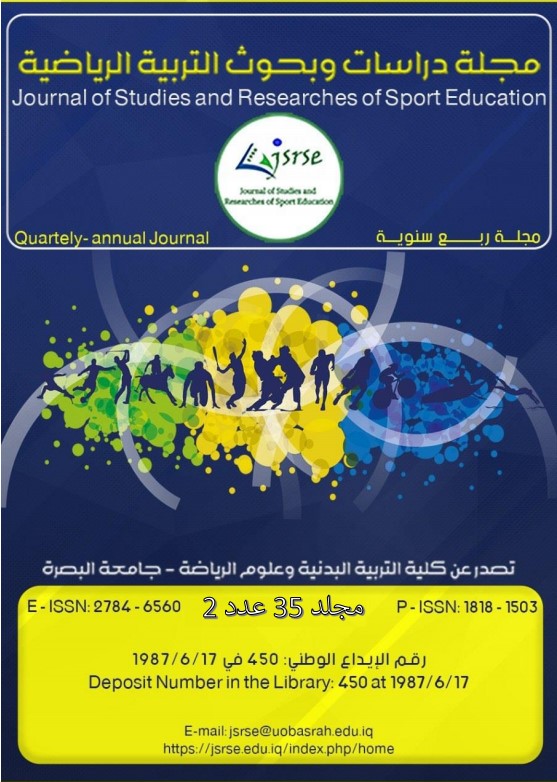The effect of visual abilities exercises in developing the effectiveness of technical performance in boxing
Main Article Content
Abstract
The research aims to prepare educational units using visual abilities exercises to develop the effectiveness of technical performance in boxing. The experimental approach was used. The research sample numbered (16) boxers and they were divided into two groups, the first experimental group numbering (8) boxers and the second control group numbering (8). The researchers concluded that the proposed educational program showed a positive effect of visual abilities exercises in developing the level of effectiveness of technical performance for boxers. The researchers recommend using visual abilities exercises because of their effect in developing the effectiveness of technical performance for boxers
Article Details

This work is licensed under a Creative Commons Attribution-NonCommercial 4.0 International License.
References
Abdelkader, A. K. (2023). The Effect of Karen’s Model on Teaching Some Grips in Wrestling for Students. Journal of Studies and Researches of Sport Education, 33(1), 323–336. https://doi.org/10.55998/jsrse.v33i1.382
Abdul-Zahra, L. H. A. J. (2013). Find extract Impact multimedia system integrated collaborative learning style in the education of the technical performance of the elevation jerk and the cognitive level of weightlifting. Journal of Studies and Researches of Sport Education, 35.
Adel, A. B. (1999). Sports Training: Integration between Theory and Practice (p. 89). Book Center for Publishing.
Al-Mandlawi, Q. H. (1999). Tests and Evaluation in Physical Education (p. 10). Iraq: Higher Education Presses.
Al-Takriti, W. Y., & Al-Ubaidi, H. M. (1999). Statistical Applications and the Use of Computers in Physical Education Research (p. 88). Dar Al-Kutub for Printing and Publishing.
BIN WANG, KENNETH J, & CIUFFREDA. (2014). ISION TRAINING AND SPORTS, KLUWER (p. 22). NEW YORK: PLENUM PUBLISHERS.
Fouad, G., & Abdullah, I. (2005). The effectiveness of visual training on some skillful variables and visual abilities in volleyball. Journal of Comprehensive Education Research, Second Volume for the Second Grade, Faculty of Physical Education for Girls, Zagazig University.
Gamal, A. E.-D., & Nahed, E.-S. (2007). Kinematics (1st ed, p. 55). Tanta University.
Hamad, S. H. (2021). The effect of skill exercises using educational techniques on some cognitive, sensory-motor abilities and performance of offensive and defensive foil skills at the ages of (15-16) years [University of Anbar]. https://doi.org/DOI:10.13140/RG.2.2.25790.29769
Hamad, S. H., Saad, H. M., Agam, B. I., & Farhan, M. K. (2024). THE EFFECT OF VISUAL TRACKING EXERCISES ON SOME MOVEMENT ABILITIES AND THE SKILL OF DEFENDING THE COURT IN VOLLEYBALL FOR STUDENTS. Proximus Journal of Sports Science and Physical Education, 1(7), 77–83.
Isabel, W. (2001). Why visual training programmers for sport don’t work. Sports Sci, Mar.
Magda, I. (2006). The effectiveness of a visual training program on some visual skills and visual cognitive skills and their relationship to the level of performance of some control and mastery skills among rhythmic gymnastics juniors. Comprehensive Education, Faculty of Sports, 12(3), 6–8.
Magdy, A. I. (1999). Reading in the Methodology (p. 458). Egyptian Renaissance Library.
Resan, K. M. (1989). Encyclopedia of Measurements and Tests in Physical Education and Sports. Higher Education Press.
Sami, M. H. (2005). Introduction to Modern Boxing (p. 328). Shajarat Al-Durr Library.





 IASJ
IASJ CC-BY-4.0
CC-BY-4.0 turnitin
turnitin ISSN
ISSN DOAJ
DOAJ Crossref
Crossref GoogleScholar
GoogleScholar Orcid
Orcid